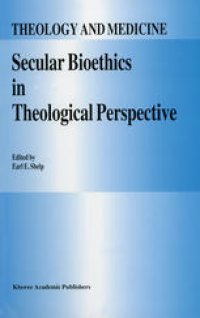
Ebook: Secular Bioethics in Theological Perspective
- Tags: Ethics, Religious Studies, Philosophy of Medicine, Theory of Medicine/Bioethics
- Series: Theology and Medicine 8
- Year: 1996
- Publisher: Springer Netherlands
- Edition: 1
- Language: English
- pdf
Theologians and theologically educated participants in discussions of bioethics have been placed on the defensive during recent years. The dominance of religious perspectives and theological voices that marked the emergence and establishment of "bioethics" in the late 1960s and 1970s has eroded steadily as philosophers, lawyers, and others have relativized their role and influ ence, at best, or dismissed it entirely, at worst. The secularization of bioethics, which has occurred for a variety of reasons, has prompted some prominent writers to reflect on what has been lost. Daniel Callahan, for example writes, " . . . whatever the ultimate truth status of religious perspectives, they have provided a way of looking at the world and understanding one's own life that has a fecundity and uniqueness not matched by philosophy, law, or political theory. Those of us who have lost our reli gious faith may be glad that we have discovered what we take to be the reality of things, but we can still recognize that we have also lost something of great value as well: the faith, vision, insights, and experience of whole peoples and traditions who, no less than we unbelievers, struggled to make sense of things. That those goods are part of a garment we no longer want to wear does not make their loss anything other than still a loss; and it is not a neglible one" ([2], p. 2).
This collection of 13 original essays by theological and religious ethicists challenges the sufficiency of secular bioethics. While acknowledging the importance of procedural considerations in bioethics, the contributors raise fundamental questions about the priority according to the autonomy of persons and the legitimacy of excluding religious reasoning in making medical-moral decisions and public policies. The analyses of theories, practices, concepts and methods reveal inadequacies and weaknesses within secular bioethics, while illustrating the distinctive and enriching contributions of theology and faith traditions to bioethics. These essays suggest that the relegation of religion to the margins of bioethics discussions is premature and, perhaps, ill advised. A lively debate regarding the adequacy of secular bioethics is joined in this collection. It will be built upon in subsequent literature on the subject.